Top MBA Recruiters: Siemens

As the largest industrial manufacturing company in Europe, Siemens has a reputation for developing quality products from power generation technology to building automation, medical technology, railway vehicles, fire alarms, and PLM software. The Munich-based company was founded 172 years ago in 1847 as a multinational conglomerate with offices all over the world. Which means working at Siemens post-MBA graduation is very attractive.
Continue reading…The Top 5 German Companies Hiring MBA Grads
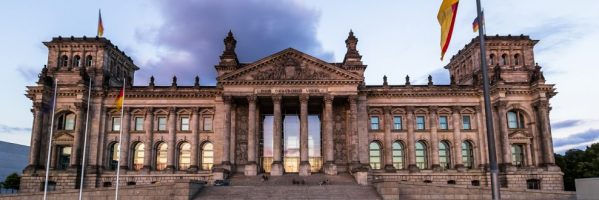
Germany is an appealing place to live and work—standards of living are high for residents as international cities like Berlin and Munich are just a short train ride away from forests, hiking trails, and lakes. U.S. News and World Report ranks Germany fourth overall in its ‘Best Countries’ category, which makes German careers potentially very appealing.
Continue reading…5 Questions with the Senior Associate Dean of MBA Programs at BU Questrom
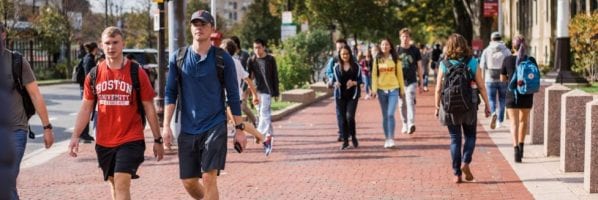
In our latest installment of the MetroMBA “5 Questions” series, we speak with Barbara Bickart, the Senior Associate Dean of MBA Programs at Boston University’s Questrom School of Business. Bickart talks about the qualities MBA candidates possess, unique opportunities for MBA students, and things to do in Boston.
1. Why should an MBA candidate be excited to apply to Questrom?
“I believe three main factors make our program unique.
First, Questrom has a strategic focus on three sectors that we have identified as drivers of growth in our economy—digital technology, health, and social impact. We have developed unique program offerings as well as vibrant communities around these three sectors, and many of our students participate in one of these programs.
Second, our program is designed so that students can obtain a deep base of functional knowledge and key skills, and start their elective courses in the first year. Our first year is divided into four, seven-week modules. In the first three modules, students take three classes and complete an integrated experiential project. For example, in Mod 3, students take Strategy, Information Systems, and Organizational Behavior while working on a client-based project that addresses strategic issues in one of our three sectors. Through this process, students learn to view and solve problems from a multi-disciplinary perspective. Students can start taking elective courses during Mod 4.
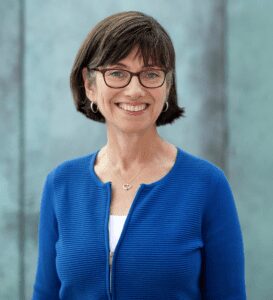
Barbara Bickart is an Associate Professor of Marketing and Senior Associate Dean for MBA Programs.
Finally, Boston is a great place for students studying business, with a vibrant culture around innovation and technology. Our project-based learning draws on the Boston eco-system, and many of our students end up working in Boston or the immediate area.”
2. What type of MBA candidate is the best fit for Questrom?
“Our students come from a variety of backgrounds and experiences. In addition to being smart, intellectually curious, and engaged, the two traits that I would say best characterize our students are that (a) they care about community and the impact of their work on society and (b) they are agile and creative—they are flexible in how they think about and solve problems and look outside the box for solutions.”
3. How does Questrom stay on the cutting edge of MBA education? Is there a unique feature you can highlight?
“We are constantly evaluating and updating our curriculum, with a particular focus on adding more experiential learning opportunities in our courses and co-curricular experiences. Our faculty’s research often drives our elective courses. For example, one of our most popular elective courses is Platform Strategy. This course was developed by Professor Marshall Van Alstyne and is based on his book Platform Revolution: How Networked Markets are Transforming the Economy and How to Make the Work for You (2016, W.W. Norton and Co). In this course, student teams work on consulting projects for major platform-based companies. Past projects have been sponsored by Airbnb, Allstate, Capgemini, eBay, edX, Jawbone, Haier, Huawei, Mahindra, Pearson, PGA, PTC, Siemens, SAP, startups, and many others.”
4. What unique opportunities outside of the MBA curriculum make Questrom stand out?
“Our student community is active and engaged—there is always something going on here at Questrom. Students take advantage of the Boston ecosystem—attending networking events and conferences, for example, in health and life sciences. Questrom students are also involved Innovate@BU, which is a BU-wide initiative supporting student-led innovation and entrepreneurial activities. Students take advantage of the Build Lab IDG Capital Student Innovation Center, which is an on-campus co-working space for collaboration and new ventures. The Questrom School of Business Internship Fund provides financial support our students interested in exploring internships at not-for-profits. Finally, we offer a number to global learning opportunities, both in our curriculum and via student-run trips. Groups travel to Paris to study luxury marketing, South Africa to study social impact, Israel to study entrepreneurship, Vietnam to study manufacturing, and Silicon Valley to learn more about digital technology.”

“The views of Cambridge and Boston are amazing. I particularly love walking along the Charles during the Head of the Charles rowing races in October,” Bickart says.
5. What’s your favorite activity in Boston? Why?
“My favorite activity in Boston is to walk along paths on the Charles River. From my office, it takes just a few minutes to get to this path. The views of Cambridge and Boston are amazing. I particularly love walking along the Charles during the Head of the Charles rowing races in October. The races are exciting and fun to watch, and there is a lot of energy in the crowd.”
Inside the NYU EMBA Global Study Tour to Vietnam

Global study trips are one of the most valuable opportunities available to MBAs. It can provide students with the chance to experience different business practices, learn from companies across the world, and better understand the global marketplace. It’s a beneficial learning environment for students in any industry and job function.
At the NYU Stern School of Business, the most recent Global Study Tour took a group of Executive MBA students to Ho Chi Minh City, Vietnam. During the trip, students met with representatives from a wide range of companies including Vina Capital, Grab, AstraZeneca, Siemens, Esquel Group, and more. Don’t worry; they also had plenty of time to sightseeing and eat the local food.
To learn more about this most recent Global Study Tour to Vietnam, we spoke with Anjou Martinez, an ’18 EMBA student, who was on the trip.
MetroMBA: What was the highlight of the trip for you?
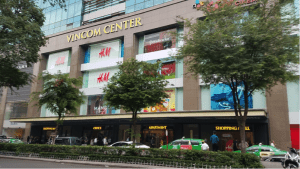
Vincom Center
Anjou Martinez: The best part of the trip for me was the Local Market Immersion, where each group was assigned a tour guide/interpreter and was given an itinerary to visit a variety of local places to observe the daily life in Ho Chi Minh. My group was tasked to visit Vincom Center, a high-end shopping mall equipped with residential and office space. At lunch, we sampled traditional Vietnamese cuisines such as Bun Bo Hue, a traditional Hue-style beef noodle soup, Xu Chicken Rice, a crispy chicken dish with ginger chili soy sauce and aromatic rice, and Sautéed Vermicelli Noodles with vegetables.
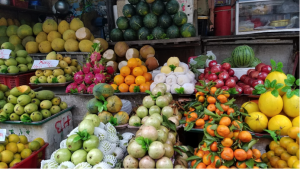
Ben Thanh Market
After lunch, we walked to the famous Ben Thanh Market, an indoor marketplace that sells local handicrafts, branded goods, and souvenirs at inexpensive prices. In this setting, prices are not fixed, so you have to haggle to find a bargain. We also visited Phuong Ha, a specialty grocery store for expats and more affluent locals. Most of the goods were manufactured from the U.S., Europe, and Australia.
On our way to our last stop, which was Maybank, we added a side trip to the Bitexco Financial Tower, which is the tallest skyscraper in Saigon. We ended our immersion at the bank, which was closed by the time we arrived—it closed at 3 p.m., which we thought was early compared to U.S. standards.
Metro: What company visit had the greatest impact on you and why?
AM: My favorite company visit was at Doan Potters, a private company in Binh Duong province which exports its pottery and home décor products to big companies such as Wal-Mart, Home Depot, Lowe’s, Crate & Barrel, and Pier 1 Imports. The management was very accommodating. They broke us into groups and assigned us an expert to tour their facilities and better understand their business from converting the raw materials into clay, designing, slip-casting, jiggering, hand-turning, glazing, carving, and firing. This experience showed me how small businesses in Vietnam can thrive, make an impact in their community, and profit globally.
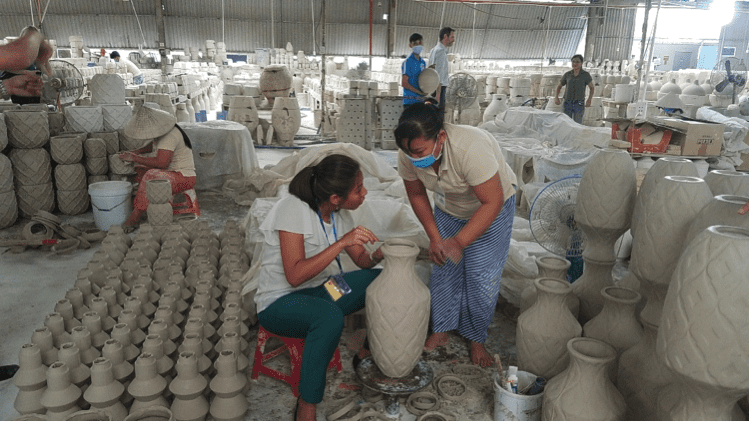
Doan Potters
Metro: Can you share one of your funniest situations or experiences in Vietnam?
AM: The most unique experience I had in Vietnam was after class, when several of us rode on the back of a scooter driven by our personal driver/guide to explore the bustling streets of Saigon while making food stops at local eateries. It was exhilarating to go with the traffic flow with no clear driving lanes and directions. We ate like the locals on low tables and low stools in a crouch position. We were on the streets with Back of the Bike Tours for most of the evening, and we ventured from District 1 to District 3 and 10. I thought it was the best way to live like a local for one night. My driver Phuong was very helpful in answering questions about her country and what it was like for her—as a recent a college graduate—to live in Saigon.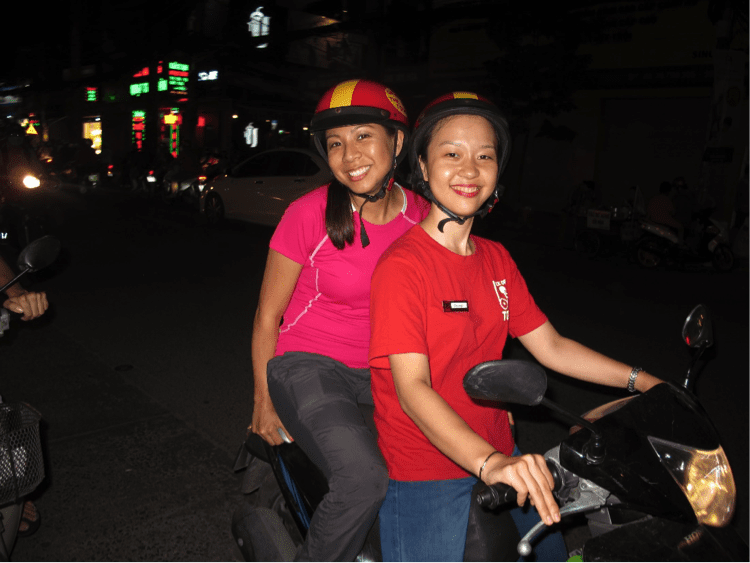
Metro: What surprised you the most about your trip?
AM: Coming into Vietnam, I thought they were a strict Communist country like China. However, I was surprised to find out that the government has done a lot of things to improve capitalism by encouraging privatization. Small- and mid-size businesses are indeed thriving in Saigon.
Metro: Why did you decide to go on the Global Study Tour to Vietnam?
AM: As part of the NYU Executive MBA program, we had an option to go to a global study tour (GST) in Vietnam or Greece. I thought a GST in Vietnam is more of an educational experience for me since I had lived in Southeast Asia when I was younger. I think Vietnam has its own charm and interesting history—so much so that I was inclined to travel more than 20 hours one-way to experience what it had to offer.
Metro: How did the trip enhance or change your view of international business?
AM: Seeing is believing. Aside from Doan Potters, we also visited Esquel Group, a global textile and apparel manufacturing company that boasts clients such as Nike, Ralph Lauren, and Tommy Hilfiger. We witnessed how shirts and pants were made from scratch from cutting, sewing, embroidery, silkscreen, laundering, and packaging. Now, when I go for a run and put on Nike apparel, I think of Esquel’s manufacturing facility and how the world is a smaller place. The East has really met the West. International business can flourish by establishing global partnerships that create win-win situations for both companies.
Metro: Why would you recommend that an MBA student travel abroad during their program?
AM: My global study tour was an eye-opening, educational experience that cannot be matched by lectures, course readings, or videos. Students must immerse themselves in the culture, language, customs and thus, business opportunities. The academic structure of the global study tour optimized the learning.
Alumni Profile: Josefina Guillen, Lake Forest Graduate School of Management MBA
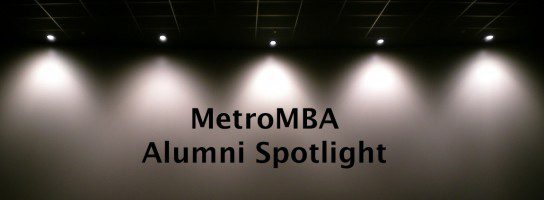
Josefina Guillen is currently a health care and operations project manager who has worked at such companies as Abbott, Pfizer, Hospira, Siemens, and Procter & Gamble. She received her MBA from Lake Forest Graduate School of Management (LFGSM) in 2015 with a focus in operations, lean management, and healthcare. Very well learned, Guillen also holds a Master’s degree in quality management and a BS in chemical engineering.
